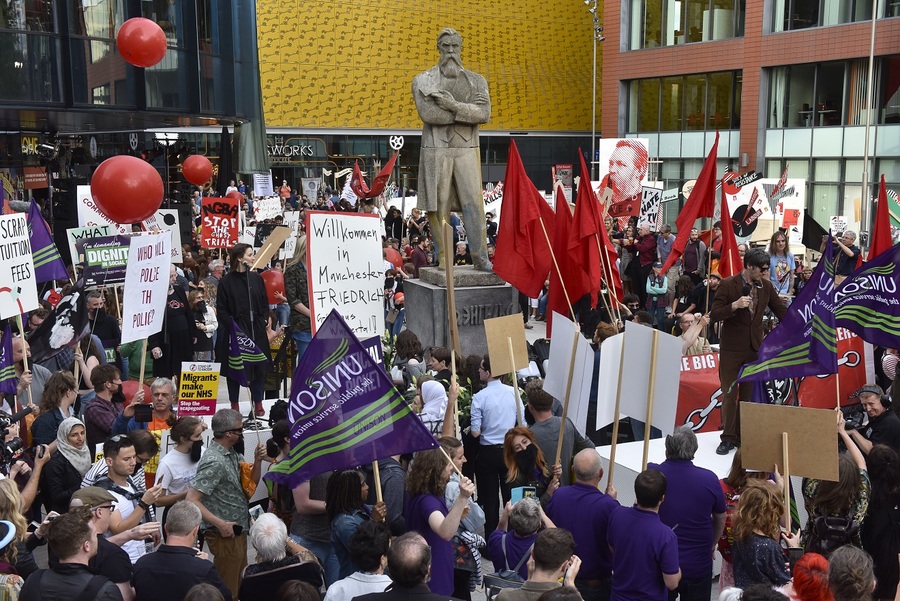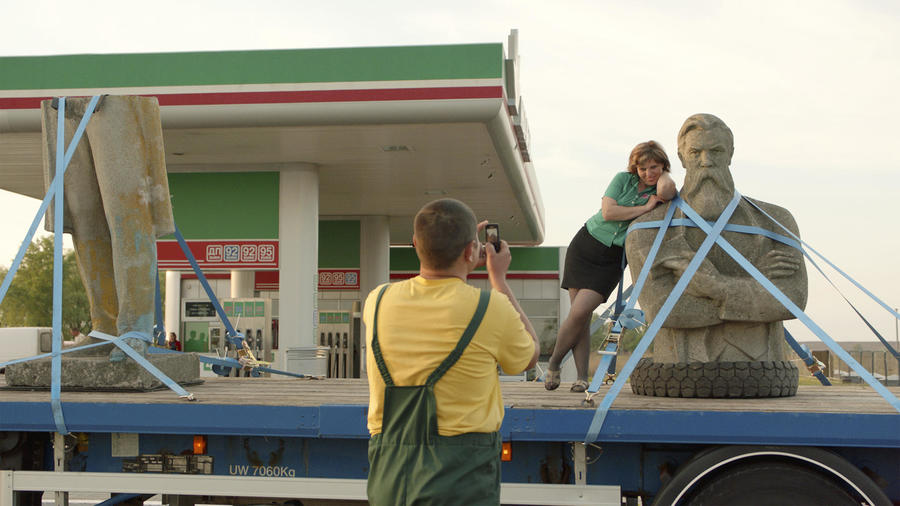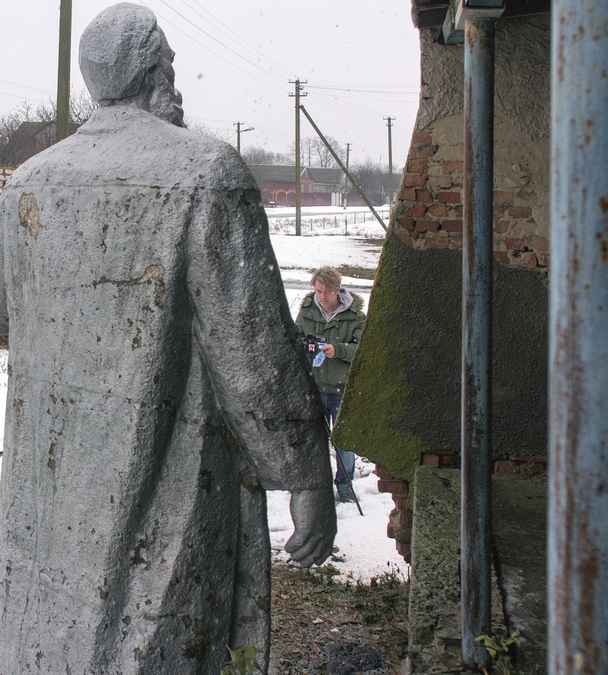Phil Collins on his new Friedrich Engels film Ceremony
In Ceremony, Berlin-based British artist Phil Collins brings Communist Manifesto co-author Friedrich Engels back to Manchester, a city that helped form his socialist ideas. We ask Collins what Engels would make of the UK today
Two years ago, artist Phil Collins travelled to a Ukrainian village near the Russian border and found a statue of Friedrich Engels unceremoniously sequestered beneath an old tarpaulin. This stone tribute to the German radical thinker – co-author with Karl Marx on the Communist Manifesto – had been cut in two and left to rot, having been torn down during Ukraine's policy of decommunisation, the process by which all statues and place names associated with the former Soviet Union were removed or renamed. Collins had a new home planned for Engels, and set about schlepping him on a peripatetic journey through Europe to a plinth in Tony Wilson Place, Manchester, a city Engels lived in for 20 years and where he wrote his seminal work, The Condition of the Working Class in England.
This effigy of Engels was welcomed into the city by a huge experimental event that closed the 2017 Manchester International Festival. Ceremony incorporated grassroots community activists, the stories of local people, a soundtrack by Mica Levi and Demdike Stare and even a new anthem by Gruff Rhys. The procuring of the statue and the MIF celebration are tied together with Collins' new multifaceted film, also named Ceremony, which acts as a document of Engels' journey back to his former home and asks what he would make of the Manchester of glass and steel he'd find today?
We spoke to Collins about Engels and Ceremony before the film's UK festival premiere at Alchemy Film and Moving Image Festival in Hawick.
The Skinny: What initiated the idea to bring a statue of Engels to Manchester?
Phil Collins: I grew up in the North West of England and was a student in Manchester in the late 80s and early 90s. I was interested in the fact that Frederich Engels had lived in Manchester for 20 years but this didn’t play an obvious role in the city’s heritage. Young Engels first arrived from Wuppertal in 1842 to run his father’s factory, one of the large cotton mills on which Manchester’s reputation as the ‘shock city’ of the 19th century was founded. The building survived until the late 1980s when it was demolished. As a child coming into the city, I remember its tall chimney sticking out from the side of the M602 like a sore thumb, as it was locally known.
In 2010 I made a project with former teachers of Marxism-Leninism from East Germany looking at how their lives changed after the fall of the Berlin Wall. At the time I was working on an idea of bringing over the people I’d met to teach a pre-1989 curriculum to high schools in Manchester, as a way of acknowledging both the city’s radical history and the legacy of Marxist thought in our day and age. This never came to fruition so when Manchester International Festival invited me to make a new work, I proposed a memorial to Engels instead.
As part of my research in 2010, I came upon information about an employee of the Central Manchester Development Corporation who in the 1990s, as the Eastern Bloc was collapsing, proposed finding a decommissioned statue of Engels and bringing it to the city. By the time the Corporation folded in 1996, this was never realised. Whether it was a true story or an urban legend, I thought it’d be nice to wed two unrealised ideas and bring Engels back home.
The film is multi-layered, blending documentary, archive and performance. Can you talk about your vision for the film? Was every element planned out? Or was it a case of discovering the form the film would take as you made it?
The film was meant to weave together different strands, from the search for the statue and its travel across Europe, to the stories of people from Manchester and the inauguration event, which itself was partly a live film set, partly a staged performance, and partly a social space in which anti-austerity activists and community groups could engage with a wide audience. Much of it was about setting up situations and seeing where they take us. But I did want the film to work as a mosaic of genres and visual approaches, and to convey a variety of aesthetic and emotional tones.
The statue was put in storage because of the process of decommunisation in Ukraine and its associations with the Soviet regime. What does the statue mean in its new context in Tony Wilson Place?
The statue’s new location in Manchester is a ‘privately owned public plaza’ on the site of a former gasworks and a stone’s throw from where the slums of Little Ireland used to stand, the subject of some of Engels’ most memorable writing. For me, the transposition of the statue, with all the traces of history it carries, into a glass-and-steel landscape of office blocks and corporate retail chains, recognisable from any British city, creates a charged dynamic. Its incongruous presence in this context could, for example, initiate a reflection on the relationship between private and public space, or the fact that large swathes of Manchester’s city centre have been sold off for luxury developments.
Engels surrounded by Pizza Express, Starbucks and Gazprom is a reminder of the complexities of the present moment. He wasn’t a purist, he was a mill-owner and a communist, conservative in some of his views and extremely progressive in others. Such contradictions speak to the nature of contemporary capitalism which, no matter how much you oppose it, is imprinted on the ways we think, behave, relate, and communicate. The same goes for Engels’ work, which was often subject to crude ideological simplifications from both the Right and the Left.
I love the scenes from the Engels statue's point of view as you drive him around the streets of Manchester. Do you think he'd recognise the place?
Well, Engels lived all over Manchester so he knew the place intimately. Since his time, capitalism continued to thrive largely unchecked, perpetually changing the landscape of the city. I’m not sure how much of the physical structure of the city would be familiar to him but he’d recognise the spirit of Mancunians, grounded in solidarity and common dignity, like so much of his own work.
If Engels were to write The Condition of the Working Class in England today, who would be the subjects?
Poverty today doesn’t register in the same way it did even thirty years ago. Many of the conditions which Engels diagnosed in his era have taken new forms but are still relevant in today’s rip-off Britain. After consecutive Tory governments committed to the relentless assault on the poor and those in need, the levels of inequality and disregard for human life are unprecedented in contemporary terms, while the callousness of the mighty is almost medieval. It’s small wonder then that Engels’ work gains new relevance or that, in the wake of the Grenfell atrocity, a parallel was made to his notion of ‘social murder’, which felt like a salient and urgent comparison between the time when he was writing and our present moment.
What do you hope the Engels statue will bring to the people of Manchester?
In popular imagination, Manchester represents the birthplace of capitalism and the factory system. But there is a whole other, alternate history of counter-movements which have also shaped this place and the world at large – from Peterloo, the Chartists and the 1842 general strike, to the suffragettes, the Vegetarian Society and the principles of communism, founded through Engels’ own work, as well as that with Karl Marx. It is these histories of resistance and the radical heart of the city that could not be easily found among its memorials, statues and street names. Hopefully, the sculpture of Engels as a new public monument might subtly shift that balance.


